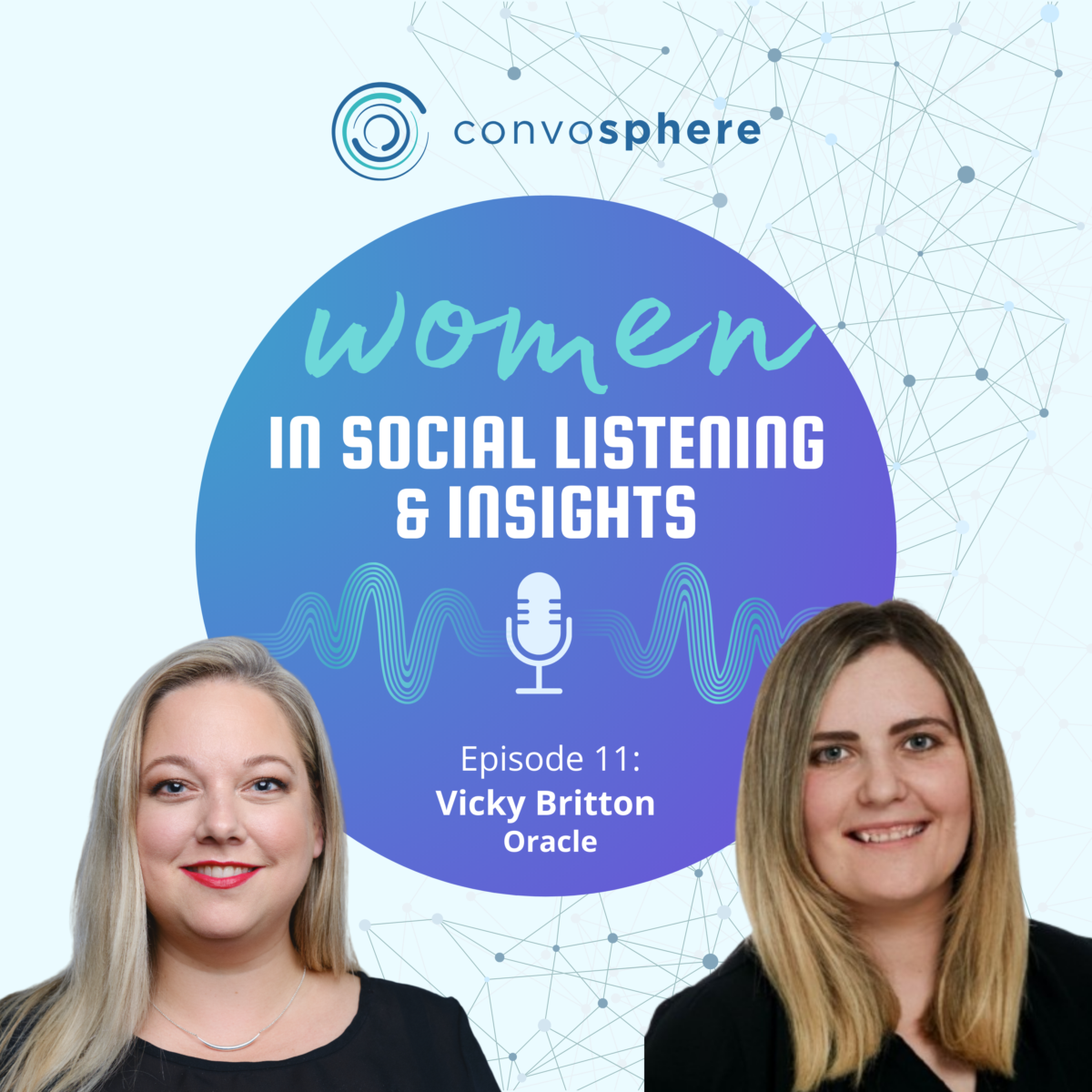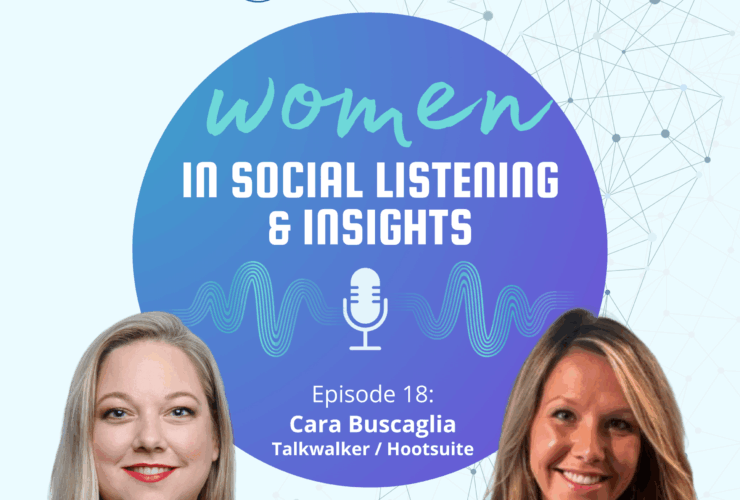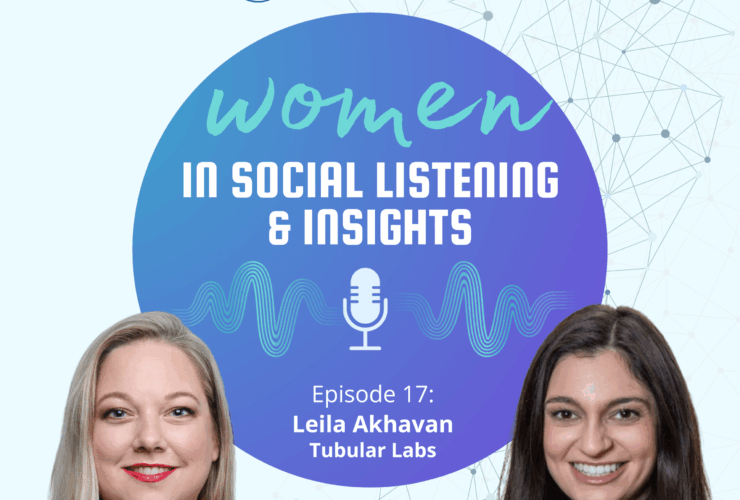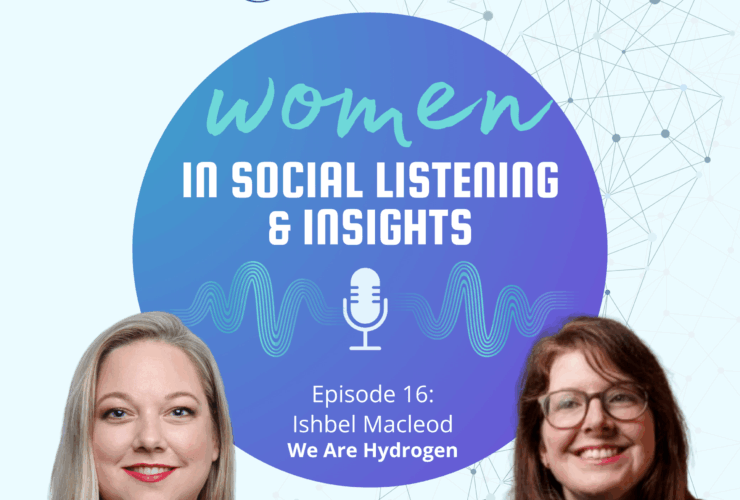A Podcast Series Dedicated to the Women in Social Listening and Insights
In this podcast series, Convosphere’s CEO, Jackie Cuyvers, meets some of the leading women in the industry. Each episode delves into their unique career paths, experiences and perspectives in the ever-evolving world of social listening, market research and digital insights. This series not only highlights the significant contributions of women in the field but also serves as a platform for sharing knowledge, challenges and triumphs.
Jackie Cuyvers meets Vicky Britton, Associate Principal at Oracle Life Sciences.
In this episode of the Women in Social Listening and Insights podcast, host Jackie Cuyvers sits down with Vicky Britton, Associate Principal at Oracle Life Sciences based in the UK. Vicky shares her fascinating journey from studying journalism to becoming a key player in the world of social intelligence, particularly within the pharmaceutical industry. With a focus on delivering search and social media intelligence projects, Vicky offers insights on how she leverages social media data to bring unfiltered patient experiences to light in the healthcare sector. Jackie and Vicky explore a range of topics, including the importance of collaboration across teams, challenges in dealing with misinformation and the critical role of data visualisation. Vicky’s enthusiasm for social listening shines through as she discusses trends, the integration of AI and the evolving landscape of social intelligence. If you’re eager to learn from a trailblazer in social listening or are passionate about advancing your career in this field, this episode is a must-listen. So grab your headphones, and let’s dive in.
Time Stamped Overview of the Podcast
00:00 – Women in Social Intelligence and Pharma
06:20 – Addressing Misinformation in Pharma Social Listening
08:27 – Distinguishing Misinformation from Disinformation
12:08 – The Importance of Cross-Functional Data Collaboration
15:03 – Contextualising and Simplifying Data Visualisations
18:35 – Moving Beyond Social Media for Deeper Insights
23:38 – Wrap-up and Final Reflections
24:26 – Subscribe to the Women in Social Insights Podcast
Podcast Transcript
Jackie Cuyvers:
Welcome to the Women in Social Listening and Insights podcast, where we showcase the incredible work of women working in the field of social intelligence. My name is Jackie Cuyvers, and I’ll be your host for this journey. In this podcast, we’ll be speaking with women from enterprise, agencies and academia who are leading the charge in the world of social listening and insights. Together, we’ll be exploring their careers, the challenges they’ve faced and overcome and the innovative solutions they’ve developed. Our goal is to provide valuable insights and advice to our listeners who are passionate about this field and committed to advancing their careers. Whether you’re a seasoned professional or just starting out, you’ll find inspiration and guidance in these conversations. So sit back, relax and get ready to learn from the women who are shaping the future of social intelligence. Let’s get started.
Jackie Cuyvers:
Today, we’re joined by Vicky. Vicky, take a moment to introduce yourself, please.
Vicky Britton:
Thank you, Jackie. I’m Vicky Britton. I’m based in the UK. I’m an Associate Principal at Oracle Life Sciences. I work with pharma companies delivering search and social media intelligence projects.
Jackie Cuyvers:
Can you tell us a little bit about your background and how you first got involved in this field? What did your path look like?
Vicky Britton:
Absolutely. I originally studied journalism. I was very interested in communication when I was younger and graduated in 2012 in the middle of an economic recession. So I figured I’d better pivot, as there were very few stable jobs in journalism at the time. There were a lot of tech companies in Dublin, a lot of social media companies, so I figured it would be great to pivot into the social media space. I actually got my start in social media by doing an internship for the European Parliament in Brussels. I moved over there and the internship was in social media monitoring.
I absolutely loved it. I came back to Dublin, was dying to get into a social media company and ended up going into Facebook as a contractor. I worked on the advertising side for a while, doing paid social media campaigns, and eventually made my way into a social media intelligence agency from there – and I haven’t looked back.
Jackie Cuyvers:
Can you describe your current role and how you use social intelligence?
Vicky Britton:
Sure. As mentioned before, I’m working in the pharma and life sciences space, so all of our work is tailored for healthcare. We do a lot of research around patients, healthcare providers and caregivers, and we work with other teams within the business like qualitative research teams, where we integrate social media insights. We also do standalone projects looking at areas such as the patient journey. We do market landscape analysis and provide pharma clients with insights around a launch or a conference. So we provide a wide range of services for clients. Recently, we’ve also been working in the real-world evidence space.
That’s looking at people’s experiences outside of clinical trials in real-world settings. We absolutely love that work. It’s fascinating to use these unfiltered insights for areas like regulatory approvals or to inform treatment decision making – and very rewarding.
Jackie Cuyvers:
Sounds like you’ve worked across the entire pharma lifecycle. Could you maybe take us through a recent project you worked on and what you may have learned from it?
Vicky Britton:
Yeah, absolutely. We did a recent project in the rare disease space. Typically, a rare disease affects one in 2,000 people, so we’re looking at an area where there aren’t many patients at all. There are difficulties around diagnosis and treatment, and less is known about these conditions. We used social media to understand the patient journey and were able to get great insights from the data – context, details around advocacy and the types of communities they go to.
The client was really surprised by the amount of data we could access and by the patients’ medical literacy. Particularly in the case of rare diseases, patients often have to educate themselves and advocate for themselves, picking up a lot of knowledge along the way. Social media is definitely a great way to capture those experiences.
Jackie Cuyvers:
Sounds like you’ve worked across a lot of projects and teams. How do you approach collaboration and teamwork in social insights projects, and what skills do you think are essential for success?
Vicky Britton:
I think it’s best to have small teams that are agile and proactive. In terms of getting projects completed quickly, it helps when the team is small and works closely together. It’s also important to play to people’s strengths. Some people lean more technical – they’re fantastic at building queries, really interested in the tech, can set up dashboards quickly. Others are more focused on qualitative analysis – they dive into experiences and write fantastic insights. So it’s about playing to strengths. In a small team, communication is easier and things move faster.
In terms of skill set, I think having a broad one is helpful. If you’re more technical, there’s a place for you. If you’re more focused on content and analysis, there’s a place for you too. More than anything, we look for attitude – being open, continuously learning and proactive in staying on top of industry trends and tool developments.
Jackie Cuyvers:
Can you talk about a time when you may have had to challenge conventional wisdom in your work, and what you may have learned from that experience?
Vicky Britton:
Sure. This comes up quite frequently with clients, especially in the pharma space where they might be using social media listening for the first time. The insights you get from it can be unexpected compared to traditional research. Sometimes we see patients speaking online about coping mechanisms, and clients may identify that as misinformation because it’s not in the literature or something they’re familiar with.
We often have to explain that when we see this kind of information online, it’s unfiltered – it reflects the reality of the patient’s day-to-day experience. If someone is using heat therapy, for example, to help with symptoms, that highlights an unmet need – that their symptoms can’t be managed with medication alone. It’s important to help clients understand that these insights are not misinformation but valuable glimpses into how patients cope and manage their conditions.
Jackie Cuyvers:
You have a lot of experience in pharma social listening. In your opinion, what is the value of social media listening for pharmaceutical companies?
Vicky Britton:
I think there’s tremendous value. It brings a completely different perspective. You get unfiltered experiences – I don’t think you can get that anywhere else. We see patients interacting in a range of environments – speaking to healthcare providers, speaking to each other, offering peer support – and that’s a valuable perspective.
It’s a necessary part of research if we want to fully understand the patient experience. It complements traditional research methods really well – both quantitative and qualitative.
Jackie Cuyvers:
What are the key challenges that might exist when conducting social listening in pharma?
Vicky Britton:
I’ve already mentioned misinformation. Sometimes clients see insights that are unfamiliar or surprising and may classify them incorrectly. We talk to them about the differences between misinformation – false information spreading online – and disinformation, which is a deliberate attempt to mislead. Then there are coping mechanisms and unfiltered perspectives, which are often misunderstood.
Pharmacovigilance is another important consideration. When we do social media listening, we need to report any mentions of side effects or lack of efficacy. That’s not so much a challenge as it is something we’re trained to handle – we complete specific training before any project that might involve this.
It’s different from other industries in terms of rigour. We spend a lot of time refining datasets, segmenting by patient, healthcare provider and so on. That’s really important in pharma – it’s not just about looking at the general population.
Geolocation is another challenge. Global insights can be really useful, and there are many global English-speaking spaces, but pharma clients often want insights by market. That’s tricky when trying to isolate, say, just the UK. Tools have evolved and we’ve adapted our approaches, but when you remove international context, you can lose important insights. People connect globally online, and we shouldn’t disregard that.
Jackie Cuyvers:
Are there patterns shifting in how people seek and consume health information online?
Vicky Britton:
Absolutely – especially with AI. Everyone’s talking about it, and clients are too. We look at social media, Google search, website analytics – the whole information environment. But now people are also going to chatbots like ChatGPT before even conducting a search.
So we need to evolve our methods to reflect how people seek information – whether they’re actively searching or passively consuming. There’s room for the industry to grow in this space and to do it in a compliant way. It’s about critical thinking and looking beyond just social media to the broader internet. We need to understand how chatbots operate and how they interact with other types of data like social and search.
Jackie Cuyvers:
Why do social media listening professionals need a stronger voice in pharma research, particularly in real-world evidence?
Vicky Britton:
I’ve seen literature based on social media data using traditional methods, but without the level of data refinement we use in social intelligence. Boolean query writing and dataset curation are core skills in our field, and if you don’t bring in that expertise, you lose something important.
If someone pulls some data and runs a traditional qualitative analysis without refinement, they’re missing a key step. People who’ve worked in social intelligence for years bring important techniques to the table – that’s why cross-functional teams are vital. We should be working together to establish best practices and standards, drawing from different disciplines.
Jackie Cuyvers:
Speaking of the importance of cross-functional collaboration, how would you – or do you – work with teams from different departments or disciplines?
Vicky Britton:
It’s brilliant when you’re part of a market research department and have access to qualitative specialists, behavioural scientists and people with therapy area expertise. For us, it’s definitely evolving. We’re bringing in expertise from these spaces and learning more about behavioural science, for example.
When it comes to online information, people often post their immediate reactions, and tying that into behavioural frameworks can be really useful for understanding it in more depth. It’s important to learn from other departments – both from a methodology perspective and in terms of therapy area expertise. If we’re doing oncology projects, for instance, having someone who knows that space well adds valuable context to the research.
Jackie Cuyvers:
So you’ve touched on rigorous methodology and established guidelines, but that’s around the work itself. What about presenting the work? Can you speak to the importance of data visualisation and how you communicate insights to stakeholders and cross-functional teams?
Vicky Britton:
Yes – I actually have very strong feelings about data visualisation. It’s really important when showing any kind of chart to add context and make it super clear and easy to understand. With social media data, you often see things like engagement metrics or volume over time, but those don’t mean much without context. Is that good? Is it bad? You can’t tell unless you explain it.
So contextualising your visualisations is essential. Keep them simple, with one clear message per chart. The way we present social media insights is so important – if it’s not digestible and actionable, it won’t land.
One method I recommend is running visuals past another team member – ideally someone not in social listening – to see if they understand every part of the slide. This is especially helpful when working with clients who are new to this methodology.
Jackie Cuyvers:
You mentioned context is especially important across different markets or regions. How do you ensure your insights and recommendations are relevant and applicable across markets and languages?
Vicky Britton:
You absolutely need to bring in regional expertise. If you’re doing a global project, having people from the relevant markets is crucial. Regulations vary – for example, in the UK and Europe, there are restrictions around direct-to-consumer marketing that don’t apply in the US.
So it’s important to bring in experts from each region and communicate clearly throughout the project. When delivering the final recommendations, you need to reflect those regional nuances and differences. There’s no substitute for working with local experts.
Jackie Cuyvers:
How do you stay current with the latest developments in social listening and insights? What resources do you rely on?
Vicky Britton:
I use social media – I know that sounds ironic, but LinkedIn is fantastic for staying connected to others in the industry. The quality of posts and updates is really good. It’s also important to stay in touch with your tools and providers – understand what’s happening with data access and how things are evolving.
So for me, LinkedIn is a key resource. Find thought leaders in your area, follow them, and stay engaged. I also set aside an hour or two each week just to see what’s going on in the industry – it’s really important to make that time.
Jackie Cuyvers:
How do you see the field of social intelligence evolving over the next three, five or ten years? And more specifically, what about within pharma?
Vicky Britton:
I think we’ll move beyond social media alone and look at the internet more broadly. Search data will be important, and we’ll need to account for AI too. We’ll start integrating other data sources and use AI to help with things like generating summaries.
We’ll also see more involvement from other disciplines – behavioural science, foresight, trend methodologies. I think we’ll move away from using social for just quick insights and start looking at trends over time – understanding how things have evolved over five to ten years. Social media is essentially a live diary, and we can learn a lot from that.
With the decentralisation of platforms, people are spreading across more spaces, so tools need to keep up. Making sure we have the right data access will be key.
Jackie Cuyvers:
Your passion for social listening and insights really comes through. How do you stay motivated and inspired in your work?
Vicky Britton:
I’ve always been interested in people – and if you are, you’ll never get bored in this work. There’s always something new to learn. In pharma, you feel like you’re contributing to something meaningful. Even if it’s in a small way, knowing you’re helping patients is motivating.
Jackie Cuyvers:
You mentioned books. Are there any you’d recommend to other social listening and insights professionals?
Vicky Britton:
Yes – Storytelling with Data is a great one for improving how you communicate insights. It’s all about being clear, having one takeaway per visual and presenting effectively.
The Elements of Style is also excellent for improving writing and editing. Even with AI helping with some of the heavy lifting, clear communication is still essential.
And I read a lot of biographies. If you’re interested in people and behaviours, that kind of reading is really helpful. It’s becoming more of a multidisciplinary role, so I’d say read widely – whether it’s data visualisation, behavioural science or life stories, it all helps.
Jackie Cuyvers:
Some great advice – and some new books to add to the shelf! Any final advice for individuals interested in pursuing a career in social intelligence?
Vicky Britton:
Get started and get hands-on experience. I mentioned my own path from journalism into social media. At the time, I didn’t know I wanted to go into social media listening – I just followed my interests. Practical experience is incredibly useful.
Also, have a proactive mindset. Educate yourself about the industry. I mentioned behavioural science and foresight – these are going to be more and more important. Even starting with one or two new areas will set you up for success.
Jackie Cuyvers:
Well, thank you so much, Vicky, for sharing your passion and experience. I really appreciate your time.
Vicky Britton:
No worries. Thank you, Jackie.
Jackie Cuyvers:
And that’s a wrap for this episode of the Women in Social Listening and Insights podcast. I hope you’ve enjoyed this conversation and taken away some valuable insights and advice from today’s guest.
If you liked this episode, please be sure to subscribe to our podcast on iTunes or Spotify so you never miss an episode. Don’t forget to follow us on LinkedIn for updates and additional resources.
I’d like to take a moment to once again thank our interviewee for joining us and sharing her story. Your contribution to the world of social intelligence is truly invaluable, and we’re grateful for your time and expertise.
And finally, if you know someone who would make a great guest, please introduce us – we’re always looking for new and inspiring stories.
Until next time, I’m Jackie Cuyvers, and this is the Women in Social Listening and Insights podcast. Thanks so much for listening.






